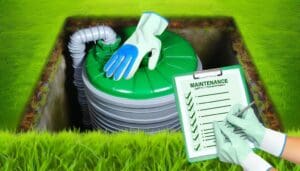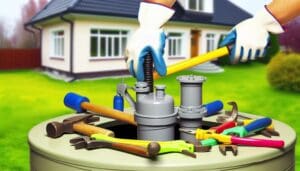Discover how to protect your septic system from breakdown with...
Read MoreYou & Your Septic Tank
Three Essential Maintenance Tips for Septic Systems
Our professional septic service team offers comprehensive septic tank pumping services to keep your system running smoothly. Get a FREE Quote Today.

Three Essential Maintenance Tips for Septic Systems
Imagine you’re hosting a big family gathering when, suddenly, your septic system backs up. The ensuing chaos is something you don’t want to experience, trust me.
So, how can you prevent such an unpleasant surprise? It’s not as complicated as you might think. With regular maintenance and a bit of foresight, you can keep your septic system running smoothly.
We’ll be discussing three essential tips that’ll help you maintain your septic system efficiently and effectively. Why not equip yourself with the knowledge that could save you from a potential mess?
Key Takeaways
- Regular septic tank pumping is important to prevent costly repairs and maintain the functionality of the system.
- Regular inspections allow for early detection of potential issues and help prevent serious problems.
- Conserving water through the use of high-efficiency appliances and reducing water usage helps maintain the longevity of the septic system.
- Proper waste disposal, including avoiding the disposal of fats, oils, grease, non-biodegradable items, and harsh chemicals, is crucial for the health and functionality of the septic system.
Understanding Septic Systems Basics
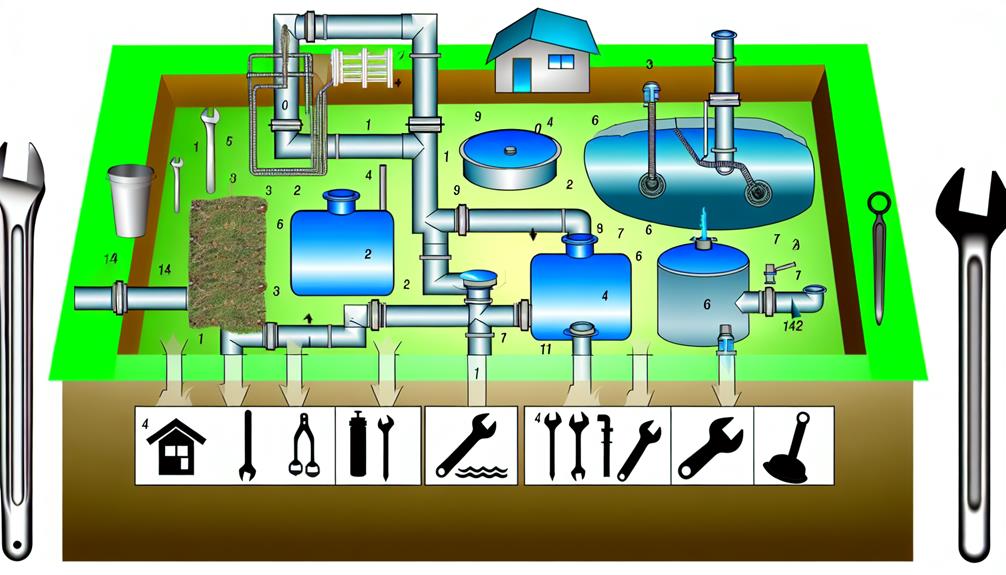
To effectively maintain your septic system, you must first grasp the basic workings of this essential home component. There are several ‘Septic System Types’; the most common are conventional, chamber, drip distribution, and mound. Each type has unique characteristics, but they all share a basic function: processing household waste in a safe, environmentally-friendly way.
The conventional system, for example, uses a septic tank and a series of drain fields, or leach fields. The waste from your home flows into the septic tank where solids settle at the bottom, forming a sludge layer. Lighter waste, like oil and grease, float to the top, creating a scum layer. The liquid waste in the middle, known as effluent, is then discharged into the drain field.
Understanding ‘Drain Field Functioning’ is crucial. It’s where liquid waste is further treated by naturally occurring bacteria in the soil. The drain field is a network of perforated pipes laid in gravel-filled trenches. The effluent seeps through these pipes, into the gravel, and then into the soil.
Knowing your septic system type and how the drain field functions helps you identify potential issues, perform necessary maintenance, and extend the life of your system.
Importance of Regular Septic Tank Pumping
Having grasped the basic functioning of your septic system and the critical role of the drain field, it’s equally crucial to understand why regular septic tank pumping is a maintenance task you can’t afford to overlook.
Frequent pumping helps maintain the overall health and longevity of your system. It’s not just about avoiding unpleasant odours; it’s about ensuring your septic system works efficiently for as long as possible.
Consider this:
- The pumping frequency is generally every 3-5 years, depending on use and size. However, more frequent pumping might be necessary for larger households or if you’re using more water than average.
- Neglecting this task could lead to costly repairs or even a complete system replacement.
- Regular pumping helps prevent the build-up of sludge and scum, which can clog your drain field and cause a system failure.
- It can also help detect potential issues before they become serious problems, saving you from unexpected cost implications.
- Lastly, regular pumping isn’t just about maintaining your septic system; it’s about protecting your property, your local environment, and most importantly, your family’s health.
Understanding and practicing regular septic tank pumping is an essential step in responsible home ownership.
First Essential Maintenance Tip: Inspecting Regularly
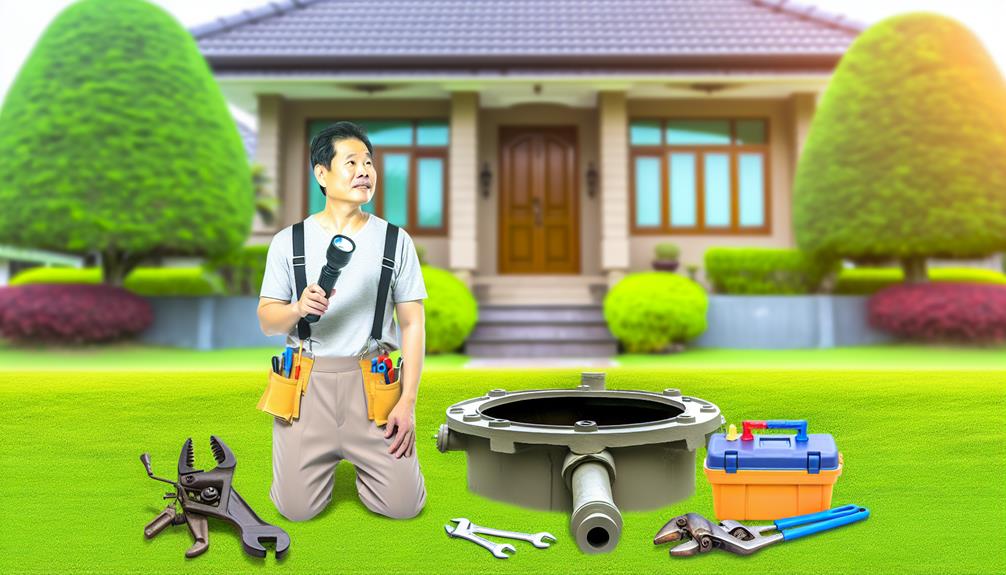
Regularly inspecting your septic system is a crucial first step in maintenance, as it allows you to spot potential issues early and prevent costly repairs. This inspection should be on your list of priorities, and you’ll need to establish a routine that suits your septic system’s needs.
Inspection schedules are paramount. Generally, you should inspect your septic system at least once every three years. However, systems with mechanical components may require annual inspections. Keep in mind that this schedule may vary according to your specific usage and the system’s age.
Emergency checkups should also be part of your strategy. If you notice signs of trouble, such as slow drains, unpleasant odors, or soggy ground around the drain field, don’t wait for the next scheduled inspection. Act immediately.
During inspections, check for leaks and examine the scum and sludge layers in your septic tank. If the bottom of the scum layer is within six inches of the bottom of the outlet device or the top of the sludge layer is within 12 inches, it’s time for a pump out.
Second Essential Maintenance Tip: Efficient Water Use
Conserving water isn’t just good for the environment, it’s also vital for maintaining your septic system’s longevity and effectiveness. Efficient water use is a key factor in avoiding the overloading of your system, which can lead to costly issues. By implementing water conservation measures and engaging in regular leak detection, you can significantly reduce the risk of septic system failure.
Consider these practical steps for efficient water use:
- Installing high-efficiency appliances, such as washing machines and dishwashers, can save significant amounts of water.
- Showerheads and toilets can also be replaced with low-flow alternatives to further reduce water usage.
- Regularly check for leaks in your faucets, toilets, and pipes; a single leak can waste surprisingly large amounts of water.
- Water conservation can be as simple as not leaving the tap running while brushing your teeth or shaving.
- Consider collecting rainwater for use in your garden rather than using tap water.
Third Essential Maintenance Tip: Proper Waste Disposal
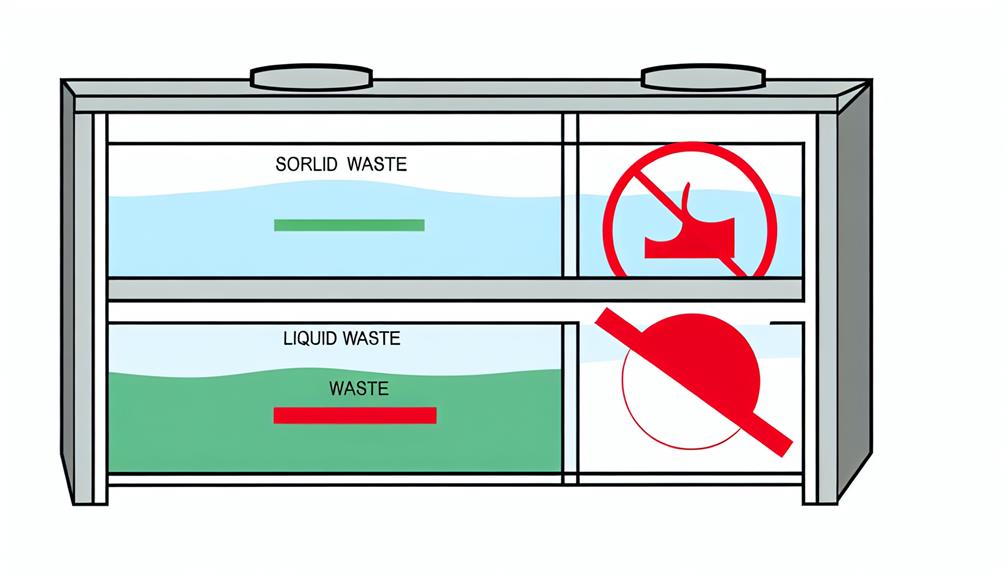
Proper waste disposal is another crucial aspect of maintaining your septic system, as what goes down your drain significantly impacts your system’s health and functionality. Garbage disposal impacts can be severe if you’re not mindful of what you’re flushing or washing away.
Firstly, avoid letting fats, oils, and grease go down the drain. They solidify and clog your septic system. Also, non-biodegradable items like diapers, wipes, and feminine hygiene products should never be flushed. They don’t decompose and can cause significant blockages.
Secondly, consider the household cleaners’ effects on your septic system. Harsh chemicals can kill the beneficial bacteria in your septic tank that help break down waste. So, opt for septic-safe or eco-friendly cleaning products instead.
Frequently Asked Questions
What Are Some Common Septic System Issues That Homeowners Need to Be Aware Of?
You should be aware of frequent backups, which can shorten your system’s lifespan. Regular inspections can prevent issues like slow drainage, foul odors, and water pooling. Don’t neglect your septic system’s maintenance.
How Can a Septic System Affect the Property Value of a Home?
A poorly maintained septic system can plummet your property value into an abyss. Regular septic system inspections are crucial to prevent this catastrophe, ensuring your home’s value isn’t negatively impacted by septic disasters.
Are There Any Signs or Symptoms That a Septic System Is Failing?
Yes, there are signs your septic system’s failing. You’ll notice bad odors, slow drains, soggy lawn near the drain field. These can shorten your septic system lifespan and degrade your septic tank materials.
Can the Use of Certain Household Products Harm My Septic System?
Yes, certain household products can harm your septic system. It’s crucial to choose septic friendly cleaning items and product alternatives. Harsh chemicals can disrupt the balance and function of your system, leading to potential issues.
What Legal Regulations or Standards Should Homeowners Be Aware of When It Comes to Maintaining Their Septic Systems?
You’ve got to stay on top of regulation compliance and septic inspection standards. These vary by state, so it’s crucial you check local laws. Don’t slip up, hefty fines can shatter your piggy bank.
Conclusion
So, you thought maintaining your septic system was a complex science, didn’t you? Well, it’s not rocket science after all!
Regular inspections, efficient water use, and proper waste disposal are all it takes. It’s as simple as that.
Remember, proper septic system maintenance isn’t just about avoiding trouble, it’s about fostering a healthier environment. Now, isn’t that an ironic twist?
A little attention to your septic system could make a world of difference!
You may also like...
Why Are DIY Fixes Essential for Septic Tank Pumping?
Tap into the importance of DIY fixes for septic tank...
Read MoreUnveiling the Average Costs of Septic Tank Pumping
Master the mysteries of septic tank pumping costs and avoid...
Read More
The Best Septic Tank Pumping Services Near You

Answer Some Questions
Let us know about your needs so we can find you the right septic tank pros.

Get Quotes
We will put you in touch with the right septic tank pros for your job and location.

Hire Right
Compare quotes, message or call pros, and hire only when ready.

